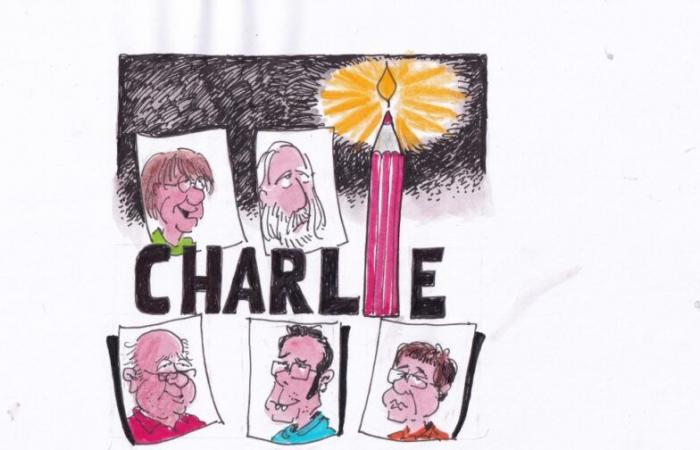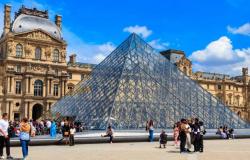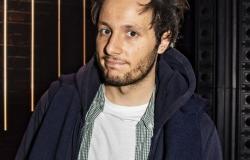Nono, since 1997 you have been crunching the news in the columns of Le Télégramme. 10 years ago, you paid tribute, through drawing, to the victims of the Charlie Hebdo attack. Tell us, to begin with, how did you experience this event?
It was a Wednesday. I was preparing food, I remember it well. I was listening to the radio when I heard about an attack on Charlie Hebdo. I started hearing names, that of Cabu for example. I turned on the television and saw the images. It was at that moment that I realized the terrible tragedy… An hour later, the editorial staff of Le Télégramme asked me for a drawing. I thought of a drawing I had made about what was happening in Algeria in the 90s, when the armed Islamic Group was assassinating artists, journalists, writers. At the time, I drew a pen riddled with bullets. I picked up this pen again but its red ink was spreading all over the streets of Paris. This drawing was put on the site but I continued to draw. At that moment, I felt the need to express myself, to show my solidarity. I was drawing, thinking of these heroes of freedom of expression.
Did you feel attacked that day in your profession, in your art?
Yes of course. This is the first time that an editorial team was decimated… At the time Charlie Hebdo was supposed to have a circulation of 30,000 copies. After the attack, it sold 8 million. It’s interesting and almost unhealthy… 8 million people rushed to the newsstands to buy this somewhat fetish object but afterwards they lost interest in the newspaper. In any case, many people discovered the profession of press cartoonist on January 7, 2015.
Has this event changed the way you work?
We all have some form of self-censorship. We are the fruit of an education, of a morality, of a culture, of a religion… But I think, in fact, that after the attack, there was a form of restraint in many newspapers, so as not to offend the readership. Today we are in a more lukewarm situation.
For Laurent Bihl, specialist in satire at the University of Paris 1er Panthéon Sorbonne, the cartoonists’ fight has changed. According to him, they must fight against ambient indifference and no longer against legislative censorship. Do you share this opinion?
Yes, absolutely. Indifference seems to me to be a very fair term. The press cartoon is not consensual. He is there to make people react, think, open the debate. He is by nature irreverent. Since January 7, 2015, I have spoken in around a hundred schools to talk to students about freedom of expression. When I go to these schools, I feel like a citizen, a citizen designer. There are laws to regulate our freedom of expression. It is certainly not up to two savages armed with Kalashnikovs to establish their own law and deny the rule of law in which we live and in which we draw.
Nono, do you have any expectations for this “birthday”?
It’s a terrible birthday but it’s important to remember. Charlie Hebdo cartoonists were pacifists and continued to fight for freedom of expression. For me, they are resistance fighters of dogmatic thinking. We lost friends but also people who represented a struggle.






